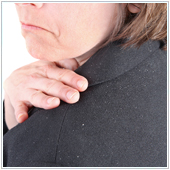 The chronic scalp condition characterized by itching and flaking is known as dandruff. While it’s not contagious and is rarely serious, it can be difficult to treat and embarrassing for the person living with it. Read on to learn how to handle this pesky condition.
The chronic scalp condition characterized by itching and flaking is known as dandruff. While it’s not contagious and is rarely serious, it can be difficult to treat and embarrassing for the person living with it. Read on to learn how to handle this pesky condition.
Who is affected by dandruff?
Dandruff is very common. So common, in fact, that it affects more than 50% of the population. In most cases, it begins in early adulthood and continues through middle age. It has been linked to hormones because of its arrival after puberty and the fact that its more common among men than women. People with excessively oily skin and hair are more prone to dandruff. Other risk factors include having a diet that lacks foods high in zinc, B vitamins and certain types of fat and having certain illnesses like Parkinson’s disease. Other causes include:
-
Dry skin
-
Psoriasis
-
Contact dermatitis (sensitivity to hair care products)
-
Malassezia (a yeast-like fungus)
-
Eczema
While dandruff is most common in adults, a kind of dandruff called cradle cap is common in newborn infants. The disorder causes a scaly scalp and can be alarming for parents. However, just like adult dandruff, it isn’t dangerous. Cradle cap usually clears up within a few months without any treatment.
Symptoms and Treatment
For most people, the symptoms are easy to identify and fairly simple to combat. There will be white, oily looking flakes of dead skin in the hair and on the shoulders. You will probably feel like your scalp is dry, itchy and scaly. You’ll notice that the condition worsens during dry and cooler weather.
Most of the time, dandruff can be treated with over-the-counter products. Because a variety of dandruff shampoos exist with a number of different active ingredients, trial and error is the best path to finding the ideal treatment for you.
Other steps you can take to reduce the likelihood of developing dandruff include:
-
Shampoo more often
-
Reduce the number of styling products you use
-
Get a little sun
-
Reduce stress factors in your life
-
Eat a healthier diet
If you’re still scratching your head after a few weeks of experimentation with over-the-counter remedies, it may be time to seek professional assistance, especially if your scalp becomes swollen or red. Other conditions like seborrheic dermatitis can be confused with dandruff and can easily be identified and treated by a doctor.
Next time you’re looking for a product in our pharmacy, please don’t hesitate to ask a staff member for a recommendation. Whether you’re dealing with dandruff or a common cold, the healthcare experts at [company_short] are happy to help. We look forward to seeing you soon.